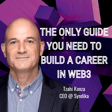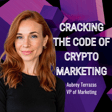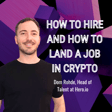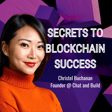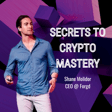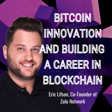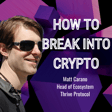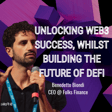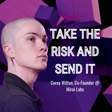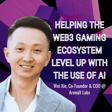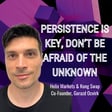Become a Creator today!Start creating today - Share your story with the world!
Start for free
00:00:00
00:00:01

Bruno Maia, Cartesi, with the only BD advice you'll ever need
Bruno Maia, a seasoned blockchain BD, shares his journey from telecom engineering to leading business development at Cartesi. In this episode, Bruno unpacks the revolutionary potential of blockchain, reveals insider tips for succeeding in Web3 business development, and exposes common pitfalls projects face in the industry.
From navigating the challenges of selling Bitcoin mining solutions in 2018 to building ecosystems that drive adoption, Bruno’s insights are a goldmine for anyone eager to break into or thrive in the Web3 space.
Tune in to discover how to make yourself indispensable, avoid costly mistakes, and harness the power of community and innovation in this game-changing technology!
Transcript
Introduction to Bruno and Career Background
00:00:00
Speaker
Bruno, welcome to the show. How are you? Hey, Jack. Good to see you, man. Thanks for having me. Yeah, you too, dude. You too. um Bruno, for people who don't know who you are, could you give us bit of an introduction, please?
00:00:13
Speaker
Yeah, of course. I'm Bruno. um i'm I'm from Brazil, raised and born in Brazil. um I'm in in the blockchain industry since 2018.
00:00:26
Speaker
My background is in telecommunication. I'm an engineer telecommunication. I work on the mobile bio communication industry. I worked several years for ah a huge ah company called Qualcomm.
00:00:41
Speaker
It's where I developed my engineering skills as well. And and over the last 10, 12 years with Qualcomm, they put me as a strategic advisor consultant.
00:00:52
Speaker
So I was moving different countries to work with mobile operators, with the executive teams. to develop a relationship with those teams and also advise them technically.
Challenges in Blockchain and Bitcoin Mining
00:01:03
Speaker
I think it's where maybe I try, I start to transition my journey from peer engineering to more business strategic background. and ah and And after that, I joined BitTheory back in 2018 as the pre-sales director of Bitcoin mining and as well as a blockchain, private blockchain.
00:01:25
Speaker
It used to be a thing by those times. um Later on, I joined a project called Cartesi as the BD lead. And i since then, I'm in, since 2018, I'm in full Web3 and super happy with my journey.
00:01:42
Speaker
Sounds cool. Why Web3 initially? ah Good question. Good question, Jack. I think I got in touch with Web3 on 2016. thousand sixteen um I ah was in love with technology, you know with the value proposition of the technology. When I start really understanding what that means, the blockchain means and the key properties,
00:02:09
Speaker
I was thinking to myself, that would change absolutely everything, right? That will create a new paradigm. People are not yet ready for that. the It's not evolution. It's a revolutionary technology.
00:02:21
Speaker
um And I want to be part of that, right? And it took me one year and a half to get an opportunity to change career path. So I left the telecom industry and joined blockchain in 2018 with the Bitfury.
Web3 Evolution and Industrial Mining Shift
00:02:37
Speaker
It years of ups and downs, very, very early stage industry, right? ah You face those challenges on trying to sell Bitcoin mining solutions.
00:02:48
Speaker
People are almost calling the police saying that you're a scammer.
00:02:54
Speaker
Right. ah No vendor financing, no bank financing, no insurance. And it was fun times. um Learning with the industry, evolving with the industry. And and I knew by...
00:03:09
Speaker
at the bottom of my heart that I was part of something that will really change what how we do things. And I'm very happy to see that unfolding in the direction that I ah predict or I tell that will be.
00:03:25
Speaker
And I think we're still in early stages. The technology is evolving, the light speed, but it still evolving more and more. It's more and more getting clear that has profound impacts on um and a lot of different industries, specifically on the on finance industry.
00:03:41
Speaker
And we see that unfolding in front of our eyes. Right. I think this year, last two years has been pivotal moments and we see very important companies like Robinhood fully embracing blockchain technology.
00:03:57
Speaker
as a as a as a driver that could not could not be more expressive in in the pivotal moment that we are uh and yeah I think from here we're gonna see things unfolding faster and faster there's no ball effect right yeah you're right cool I bet some of those people that said no to Bitcoin mining solutions back in 2018 are kicking themselves now a little bit oh man, it's it's so funny, right? Because in the adversity, in the difficulties that you also grow and learn a lot,
00:04:29
Speaker
ah So back those times trying to create compelling strategies to sell Bitcoin mining equipment, and which was a very expensive equipment, still is, right? It's not cheap to to assemble a Bitcoin mining farm.
00:04:43
Speaker
When I joined Bitfury, we were doing that transition from it's possible to mine Bitcoin from your home. with a machine or even your laptop. And because of the difficulty of the network increasing, that was not anymore possible. You need a commercial-grade product.
00:04:59
Speaker
You need to be more professionalized sector. So you're talking about a million-dollar CapEx investment, ah access to energy on industrial-scale prices, not retail price prices because it was not profitable anymore.
00:05:15
Speaker
um and And trying to sell that to the to the industry. So how to sell that to energy producers and and ways to sell that, assembling packaging products.
Blockchain in Product Development
00:05:30
Speaker
And so funny to see nowadays a lot of the ideas that we were trying to do in Bitfury by the time, it's nowadays super hyped.
00:05:39
Speaker
So behind the fence mining, using Bitcoin miners to absorb the excess of energy that is generated by the grid as a stabilizer fact or getting new wind farms facilities to kick out even before the grid is able to connect with these wind farms.
00:06:02
Speaker
um It's everything that is possible to do with Bitcoin mining. And and and nowadays is a reality. So it's it's fun. And the same thing with with understanding blockchain or and and work with blockchain on those times where the technology was far behind what is today in terms of what is possible to be done with the network and as well as user interface.
00:06:26
Speaker
Both, I would say, paths have evolved a lot. So nowadays for a developer to use blockchain to create a product, You have a much more compelling, capable network to do that.
00:06:39
Speaker
And the end user side is getting easier and easier to use products that has blockchain that functions. I would like to say that the trend is the blockchain technology melts behind the scenes and the products, there will be the driver, right?
00:07:02
Speaker
It's the same way if I ask you, what is a protocol stack that WhatsApp use or where the WhatsApp is deployed? Instagram is, I have no idea, you know, if they use React, which is the front end, what is the back end. It's just a product that addresses a need and is desired and has adoption because it solves real people's life problems.
00:07:32
Speaker
right And eventually we're going to have such products and they will use blockchain because blockchain properties or the technology offer value propositions or offer technical advantages and properties that fits into the business case of that product.
00:07:51
Speaker
That's why not every product will use blockchain. But the products that in the future use blockchain, they will use for a reason. right And then you need to understand the fundamentals of the blockchain.
00:08:03
Speaker
What is the properties of the blockchains to understand if that technology fits for you for the purpose of your product. We're going to see that unfolding more and more and more.
Strategy and Ecosystem Development at Bitfury and Cartesi
00:08:14
Speaker
We're still in the early stages of the tech of the technology that everyone's trying to sell the tech, not the product. Slowly are changing that. And we're seeing that ah becoming ah more and more the norm.
00:08:26
Speaker
right yeah for sure for sure just going back to your role uh at bitfury that sounds like it was quite a um quite hardcore sales role by trying to sell bitcoin mining solutions to to ah bitcoin mining solutions and private blockchain
00:08:44
Speaker
Yeah, it's tough. That's tough. And then your role at Cartesi, is that equally as sales heavy? Is it more like ecosystem focused? that What's the difference? that it's but It's a good question. that Back then, the product was already established. We have a product to sell. was part of the team that was helping the sales team and I was side by side with them.
00:09:08
Speaker
to create selling pitches, to develop strategies to sell the product together, right? So the sales guys was more the relationship guy. I was the guy developing the strategy to get that product sold for that customer, right? And of course, together with the sales guys, developing also rapport and relationship with the customer, right?
00:09:28
Speaker
As we like to say, everything that comes with sales on the title, the KPI is about sales, it's about revenue that you can bring. Rather, it's a pre-sales, a sales guy, your KPI in the end is revenue that you bring.
00:09:45
Speaker
ah In Cartesi, we are still developing, ah ah let's say, a revolutionary product in terms of what can be done with that.
00:09:59
Speaker
So Cartesi has this unique VM that is deploying on top of Ethereum as a roll-ups. right So since it's it's a unique VM based on RISC-V and Linux, it has opened up a huge addressable market for an Ethereum ecosystem.
00:10:17
Speaker
But as also you have the challenge of adoption, challenge of bringing this new ecosystem into the web tree, but So the challenge on the Cartesi project, on the role that I have, is much more about understanding the product, that work very close with marketing, work very close with product people, understand the stage of the product to see which type of audience is is capable to to use that product in the stage that it is, right? And try to match this product that user demand and bring adoption. So a lot of adoption strategies, a lot of ah work together with marketing BD. And to be honest,
00:11:03
Speaker
a full blown ah BG guy needs to be work super close to product and marketing. It's the two closest, i would say companions they have, in in in in in especially Web3, which is a still,
00:11:20
Speaker
let's say, a industry that is evolving
Succeeding in Web3 Business Development
00:11:22
Speaker
itself. So that makes even more critical. We can talk more about that a along our chat. Yeah, I was going to ask you, actually, this might be quite a difficult question to answer and maybe quite hard to cram years and years of experience into into a few minutes, but could you give us a crash course on how to succeed as a BD in Web3?
00:11:48
Speaker
Okay, that that that's ah that's a good one. um I think The very first fundamental rule is understand that life is always about people, right?
00:12:01
Speaker
Rather if it's a personal or a professional journey, understanding that you're dealing with people and human factor is absolutely important part of a equation of you do, it's important, right?
00:12:14
Speaker
So having the capacity to develop relationships, develop reports, be a giver more than a taker, right? It's very important in the way that you carve yourself as as as as a BD or an ecosystem person and establish yourself in a way that will drive you to succeed.
00:12:38
Speaker
right So having that in mind, I would say that choose very well also the project. Because you have constant discussion on Twitter, right? ah This very, not battle, but it occupies a lot of my timeline for a while is how marketeers are responsible to success success of a project when the project doesn't have a product, right? The marketing cannot replace the fact that you need a product, right?
00:13:10
Speaker
So why I'm telling you that? Because... choose but a project that has actually a product to sell, right? Or is going the direction that you have a product, you have a clear understanding of that.
00:13:26
Speaker
Because if you're joining a project that has only narrative, right? It will be for a while very difficult to a business or an equi ecosystem person to produce results, right?
00:13:43
Speaker
And of course, depending on the expectation of the people that is bringing on you, if they don't have clarity on the stage they are and they have completely understood unreasonable expectations of your results, you might be put in a very difficult spot from the day one.
00:14:03
Speaker
So having that understanding, it's very important. As better as you understand that, better is the chance of results. And that unfolds the second point, understanding what is your product, rather if it's a protocol or a new DeFi product or a consumer apps, understand what is your product what your product requires to evolve.
00:14:29
Speaker
And that will allow you to understand what is the partnerships that you can map and bring as an ecosystem BD person, right? To help you to expand the addressable market of your own product or protocol.
00:14:42
Speaker
And as well, bringing partners that will help you address this market. Because once you partnership with a protocol, This protocol, for example, they are also interested in your success because your success is their success as well. So you are together in that journey.
00:14:57
Speaker
um i Also understand what is in the current stage of affairs of your product. What is your target market? What is the immediate market that you can you can address and how to address that?
00:15:10
Speaker
Work very close with marketing products to ensure that you can attract the attention of that customers, right? And ensure that this customer has the right environment to taste your product, right?
00:15:24
Speaker
And design incentives to make them taste your product. But, and this is a ah very like a Lego game, right? If you bring one of these pieces too early, you might burn the bridge, right? Because if you bring a user too early, he will not be satisfied with the experience and they will come back and they will tell to his friends that this product doesn't work to be tested.
00:15:50
Speaker
And you will never heard about that. And this is a very difficult thing to measure. How bad is a negative feedback? of a frustrated customer on its own network.
00:16:03
Speaker
You want to do exactly the opposite. You need to nail down the profile of people for what we call atomic network, right? And bring this guy and has a very good experience and make them become your multiplier and help with addressing more people inside.
00:16:22
Speaker
And that will require a very well-coordinated roadmap with the product, marketing campaign, incentives, alignments. And Web3 is different than Web2 because you can implement native incentives incentives alignment across your community. right yeah don't We don't see any more users as customers, but we see users as community member with an archetype of community member. Your community has different archetypes.
00:16:53
Speaker
So align all the archetypes to have the incentives alignments and have incentives mechanisms bootstrapping, that is very important. Incentive mechanisms is enough?
00:17:05
Speaker
No, because if the incentives mechanisms is bringing people to test something that doesn't exist, you cannot make a miracle. The product is not there. you You cannot make a miracle. So you see recently very good campaigns on incentives, mechanisms, for example, Hyperliquid DeFi, right?
00:17:26
Speaker
They have a very good product with a clear market fit. They target very well. they They target market. They brought them, they incentivized them, and they came for instance because of the incentives, but they stood because of the product.
00:17:43
Speaker
And moreover, this this project has value accrual mechanisms. They are profitable. So they keep going the incentives because they can. right So having that very clear is very important.
00:17:56
Speaker
bye And understanding your target and audience because you you have the whole funnel to that. From the awareness to tasting your product to use to become a lawyer ah loyal community member.
00:18:08
Speaker
right It's not only bringing them, it's the whole funnel that
Advice for Newcomers to Web3
00:18:12
Speaker
matters. And you are in this journey together with marketing, with product, with other units in your business, depending what what type of project you want. If you are ah in a project that is more related to infrastructure, so you have...
00:18:27
Speaker
Dev relations also in this equation as as a very important stakeholder that you need to be close by. right Maybe you're going to be leading this DevRel team as well, which makes sense in a point of view of a protocol project, in my opinion. The ecosystem leading the DevRel unit makes a lot of sense in my my humble opinion.
00:18:52
Speaker
So all this understanding is super important. ah And on top of that, you need to be very good at mapping the stakeholders. like Who inside your organization can support you, can make your life easier.
00:19:06
Speaker
can help to support your initiatives and can help you to achieve results. It's always good to involve these people and create rapport with these people from the beginning because they can also be blockers.
00:19:19
Speaker
They can make your life more complicated. they needed and And having that, let's say, soft skills on mapping that is super important.
00:19:29
Speaker
So you can use your business acumen, business friendless, not only to acquiring the network, external network and customer basis and user basis, but also internally networking.
00:19:44
Speaker
to to form all these connections that will allow you to succeed, right? So all those things are, up of course, easier said than done, right?
00:19:55
Speaker
As always, um there's a lot of sweat that you need to put on those things, a lot of trial and error. I think, especially Web3, most of the projects, they should work on startup mode,
00:20:11
Speaker
Fast interactions, learning, reacting, adjusting, adapting. right So it's a very dynamic, I would say, environment and ecosystem that you need to to be to be ready for for that in in all possible ways.
00:20:30
Speaker
Yeah, that's some great advice. ummnna take I'm going to go back and listen to this afterwards and make a ton of notes. on the I'm trying to implement some of that myself. So that's a great crash course on how someone can ah succeed as a BD in Web3.
00:20:49
Speaker
So what about if what about someone is looking to break into the industry for the first time? but Do you have any advice for someone i'm trying to find their first opportunity in the space?
00:21:00
Speaker
I think reach out to Jack is the very first step.
00:21:07
Speaker
Yeah, it's ah it's a good question, man. ah um I would say that industry is changing a lot, right? um We are starting to move from an age or an era where The industry was so young that anybody coming in, hey, man, just join because we need people. doesn't matter if you don't know anything because nobody knows anything. You know, this very early stage industry required experience. Why?
00:21:33
Speaker
There's nobody with experience in the industry. This the industry was just bought, right? ah So we are slowly departing from that. to at a stage where people start asking your experience in the industry, your track record, becoming a traditional ah let's say, said economic segment, where those questions are absolutely normal, right, in the industry. So back to the telecom days, if I want to switch up jobs, the people will look at my history and where I work, why um I should be doing, what is my experience, my capacity to execute, what I'm saying that I can, right, is based on track record and this stuff.
00:22:14
Speaker
So the Web3 is already slowly going to that direction. So i would say the very first step for someone that is not ah in this industry, right, is understand that Twitter makes a lot of difference, right?
00:22:30
Speaker
ah So start engaging and creating your social footprint on this industry. And depending on the vertical that you want two two to aim, you should start building really diving into this vertical, understanding, using it, right? So if you want to go to DeFi, you need to become a little bit of DGEN.
00:22:53
Speaker
You need to understand the the industry, right? And the best way to understand that is reading, Engaging socials and using products, right? Becoming a DJ yourself, understand that industry.
00:23:06
Speaker
That will might qualify you for some conversations about that the industry, right? You might not have the previous experience, but the way that engage, the way that you talk, the way that you pursue the opportunities will be clear that people that you know what you're talking about. That might give you some edges.
00:23:25
Speaker
The same thing if you want to go to the protocol, if you go to the RWA, you need to you know it's to dive yourself into that. um and and And of course, make maybe participating some events that help, right?
00:23:42
Speaker
ah And of course, going online and and Telegram groups and start checking openings and understand how you can tune your current CV to the CV demonstrate your capacity to add value in the segment that you want to join, right?
00:24:04
Speaker
Let's take an example. A guy's working in the banking sector. He wants now to go to full force to defy segment, RWA, right? If the guy...
00:24:17
Speaker
do the steps that I mentioned before, and he turned his CV, telling this current experience that he's diving into the segment, together with his trade-fine experience, he can bring to the table some value that they can add.
00:24:33
Speaker
I think there is a study here that the person is able to sell. And why I'm saying able to sell is because ah Searching for a job position, in my opinion, is a sales effort.
00:24:46
Speaker
You are selling yourself, right? You're selling your story. You're creating the story of yourself and you need to back this story with something, which is your CV, your bio, track record, your network, your referrals.
00:25:00
Speaker
So having that exercise is super important. If the person just, I want to to to join Web3, I don't know, just anything. In this stage now, it's becoming more complicated.
Career Growth and Hiring Challenges in Web3
00:25:13
Speaker
Five years ago, i would say, you just join. Most probably start working in a company nobody understands from where the guy came because you know people are so thirsty from resources. right when when When the founder of Cartes invited me to be the leader of BD and Ecosystem,
00:25:33
Speaker
He said, man, you know, you're the only person that I know that knows blockchain. You're the only person that I know that is technical. You're the only person that I know that knows how to talk with people and is not introvert.
00:25:46
Speaker
Man, there's nobody on my network that with those right now with those with those with those capabilities. Join us. I'm not a founder, but I'm kind of a part of the founding team, let's say, and because of that.
00:26:00
Speaker
Nowadays, but probably his network, you have more people with more or less the same background that could join It's a different moment. It's a different moment. That's why I think nowadays requires a little bit more exercise from people that wants to join from from zero, from start.
00:26:18
Speaker
Yeah, you're right. I think there is also so much more information online now for someone to go and learn all of this stuff. With AI, you can really deep dive and understanding industry segments in in a very short term, right?
00:26:34
Speaker
Yeah. If the guy is savvy in one week, he can quite understand and quite use it, etc. and map. it's not It's not impossible. It just requires some work.
00:26:47
Speaker
And you're right. Yeah, it it does require some work. and I think that work is super important. The amount of people that I speak to that say, I want to get a job. in the industry, I wouldn't want to join Web3 and ask them, all right, cool. Like what kind of stuff do you do on chain right now? Like, do you trade? have you ever bought an NFT? Do you, what DeFi protocols have you used? ever staked anything?
00:27:06
Speaker
And they go, no, I don't want to put my own money in. That's far too risky. I'm like, yeah, maybe maybe the wrong industry for you then, i think. yeah That happens so often. It's quite common, even though it is so easy and realistically it is it is super accessible. You can put,
00:27:24
Speaker
$10, $15, $20 into something. Just go on Coinbase, buy some USDT, transfer it across to Metamask, for example. And just have a go at doing this kind of stuff.
00:27:35
Speaker
It doesn't cost a lot of money. Try different wallets. Yes. Install different wallets. Try the difference. Get the Metamask in your laptop and and get the hurt the hurdles right in different networks.
00:27:47
Speaker
Bridging. What is the hell? understand some pains. And, and you know, ah even for more experienced people also, the the industry is sophisticated in itself, right? Even inside, would say, protocols.
00:28:01
Speaker
What protocol you want to do? You want more good bridging? You want to go to ecosystem? BD and ecosystem was one thing when I joined Cartesi, right?
00:28:13
Speaker
I still more or less do this both, but it's getting separated. In my early days, I was very involved with marketing, PD, ecosystem product because the startup mentality requires that and gave me a lot of background.
00:28:30
Speaker
right I would say that my nowadays maybe I'm not even comfortable to get a marketing role because I really know what needs to be done that in that that manner because I spent five years closely working and and developing strategies for the adoption funnels and et cetera together with the marketing team.
00:28:49
Speaker
discussing with the product roadmaps and modular. Let's connect with this protocol, why that is important, why that matters, you know helping marketing create this narrative, which is a narrative that is important for me to understand the addressable market that I need to to tackle how I tackle in with that, which type of partnerships and actions should I take to to reach this market and adoption. And yeah, um but it's becoming more sophisticated. Slowly those things will get these individual groups, but a success project will be the one that can communicate all these pieces in the harmonized and strategized way, right?
00:29:29
Speaker
Not in science. And that's why I mentioned beforehand that a good a good guide bd should be very well versed in these three groups marketing bd and ecosystem bd bd slash effort ecosystem and and and uh brother sure so that's uh so you've just talked us through obviously how to uh like a crash course how to succeed as a bd also how someone can go about finding an opportunity What if you're already here, so you get that first role.
00:30:04
Speaker
I think you briefly touched on it a minute ago, that continuous learning is going to play a huge part in this because the industry is evolving so much. But say someone's here and they want to make themselves indispensable for founders or the person they're working with to build a real solid career for themselves.
00:30:21
Speaker
Have you got any advice there? oh Yeah, i think I think this is even general goes beyond Web3. I would say be the person that brings solution to problems.
00:30:35
Speaker
I think this is important. Be a person that knows how to be build bridges. it's It's very important. right um Be empathic.
00:30:48
Speaker
right and and And fundamentally wise, Execution matters. An idea without good execution is nothing. So be able, capable to execute makes a hell of a difference.
00:31:03
Speaker
right I, by myself, I don't like the idea guys only, right? Because very simple, convenient, comfortable to be the idea guy. Everyone wants to be the idea guy.
00:31:14
Speaker
Difficult is to to get an idea and and help to drive that to execution. That's a different story. And that's what makes the difference between success or not success, in my opinion. yeah i think Yeah, I think you're right.
00:31:27
Speaker
ah like that. I like that explanation. Yeah. um so when So what if then someone is coming into a leadership role in BD for the first time?
00:31:39
Speaker
We've talked about obviously breaking into the space, building a good career for yourself, like actually doing the role itself. How do you find good BDs? Like you as a leader, you leading your system, heading up BD.
00:31:51
Speaker
How does one actually hire and find a good BD person to join their team?
00:31:57
Speaker
It's not easy. I would say that biggest challenge is for any any organization is to scale this human capacity, right? Finding good people to to get together and and scale and and not be the one that requires like babysitting, like micromanagement stuff.
00:32:20
Speaker
It's very complicated. i have experience that I end up in, and we are not able to execute things that we would like. And if we have done that, would be extremely beneficial to to the project because maybe it was not, we brought not the right persons to in the right positions and took longer for us to realize that.
00:32:42
Speaker
So it's it's very painful, very painful. ah I would say that um
00:32:52
Speaker
Be very attentive with with the track record of the person and the capability of execution. I would say that is what matters the most, right? The person that gets the job done.
00:33:05
Speaker
So that is the key characteristic, would say. And of course, there is a very fine line between giving enough person for this person to acclimatize with the project, the cultural, establishing the relationships they need, right? giving all the tools to this person to succeed, but you need to be attentive on how thirsty and eager this person to have things done, right?
00:33:35
Speaker
That is, you know, this, you need to feel on the air, the person, oh, don't want to take this call, it's late for me. You know, what no, no.
00:33:48
Speaker
So, you know, when you're working in a startup mode, a startup mentality, Web3, where everyone is everywhere, you know, those are small indications that maybe this person is not fit for this type of working environment.
00:34:01
Speaker
and And, of course, although you need to be supportive and understanding if the person is fit for that challenge or role, you need to to be, of course, taking the decisions to to to get things done, right?
00:34:17
Speaker
And be sensitive. Maybe the person is not good for that position, maybe for another position. you know always empathy Empathy is important. In the end, you're dealing with people, right?
00:34:28
Speaker
People who shouldn't We shouldn't like treat people as it' just replaceable objects. They have lives, they have families and have responsibilities.
00:34:41
Speaker
Of course, at the same time, this person needs to to show that they value the trust and and and the and opportunity that they have been given to this person.
00:34:54
Speaker
It's a two-way street. and and And having that in a clear way, it's very important.
Flexibility and Mistakes in Web3 Business Development
00:35:02
Speaker
Yeah, I think so. Yeah, because I was going ask you in a few minutes really about whether or not there's anything that you'd really want people to know about the industry before they become a part of it. And I guess...
00:35:19
Speaker
understanding that everyone is so spread around the world and working on all sorts of different time zones. And there may be times that you're going to have to jump on calls at midnight and this kind of stuff, just because that's the only time you can actually catch someone.
00:35:34
Speaker
That's quite a, um, that is a, a real expectation of the industry. Really. I see it across all projects pretty much and in all roles, really, whether you're on the engineering side and marketing and BD, um,
00:35:48
Speaker
It's a real expectation I think people need to be aware of. But I guess it a it's not going to work for everyone. But I think personally, I think it's quite a small price to pay for having such flexibility in the roles. Because a lot of Web3 positions are quite flexible, right? As long as you're getting the job done.
00:36:07
Speaker
there's a lot of flexibility around them. But what do you think to that? like is there Are there any any other things that you think people need to be aware of before joining Yeah, thank you I think, Jack, you mentioned something that is extremely important, right? This industry is very flexible.
00:36:22
Speaker
And I think maybe, don't know, generational problem ma not, or just cultural problem, ah People need to understand that flexibility club comes with price.
00:36:33
Speaker
but You cannot only have the good side of things and doesn't expect that you don't pay the price for those good things. So if you are working industry that allows you to be everywhere in the world working,
00:36:48
Speaker
for this industry. It's a hell of a unique life experience and opportunity. So the minimum that people should give back is I'm flexible with my time as well.
00:37:00
Speaker
right If I decided myself to be half an year in Bora Bora working, that would be impossible to think about that 10 years ago.
00:37:11
Speaker
In this industry it's possible. As long as you understand that you're in a kind of unique time zone, that maybe your working day should be in a little little different different pace.
00:37:24
Speaker
and And that is the price to pay for that. So um also one thing that is more required in this industry, because I think the stage we were, is to be active in socials.
00:37:38
Speaker
right And that and thats is an important reflection. I think we are going with several changes and the Web3 maybe is the driver, technological driver for a fundamental behavioral shift in society.
00:37:55
Speaker
But it's more and more important people to start building their own personal brand and reputation. regardless of your position. right So a social presence, a social footprint, reputation, and you know your you know the way that you perceive it's becoming important, not only for BD or marketing people, but for everyone.
00:38:18
Speaker
no So having that in mind, and I think Web3, this is more, would say, it's more relevant. But it's becoming also super important for all types of industries. That's why you see more and more people in Web2 very active in LinkedIn, sharing their thoughts, sharing their ideas, right? Because you're building your your footprint, your online reputation, right?
00:38:43
Speaker
Because of that. So I would say that it's is super important. And on top of that, what we already mentioned, right? the it the stage that we are, this industry is an endless startup.
00:38:53
Speaker
So you need to be ready to work in a startup mentality, right? Which is ah super important and requires some different set of soft skills or understanding dynamics and be flexible with that, right?
00:39:13
Speaker
You cannot get from, I don't know, a very well-established industry like oil business, right? It's very specifically processed, very kind of, they are doing this for 100 years.
00:39:26
Speaker
And they they do that in a specific way because a lot of people buy, try to do it in different ways, right? And you cannot get this mindset and apply in this Web3 industry and expect that you work exactly the same. It's a much more dynamic, fast-paced, moving industry that is still trying to understand how that technology will work.
00:39:53
Speaker
solidify and be more mature to support the tomorrow businesses. yeah And we are in the middle of that. So don't expect everything sorted out, everything established.
00:40:05
Speaker
The truth of today is not that is not equal in six months. So a lot of dynamism, I would say. So that those those are the the critical things I'll say about this industry.
00:40:19
Speaker
Yeah, you're right. It's things that I say to people all the time that when they're actually looking for a new opportunity is building a personal brand. You don't have to have thousands and thousands of followers across X or LinkedIn, but I think using social media as a place to ah get your thoughts out into the industry, I think is really, really beneficial.
00:40:43
Speaker
There are still not quite a lot of ah lot of scams in Web3 going on around fake profiles, fake people, fake developers from North Korea and all this kind of stuff, right? Like hacking groups and all that kind of thing. so um I actually think even if you're just writing your thoughts a couple of times a week or the old tweet here and there and that kind of thing, you're starting to do that.
00:41:04
Speaker
It just adds a layer of credibility to you. And then also when then someone comes along to your profile, you say you send them your CV, you're applying for position, you sent your CV. you have your links on there they click through and they go well actually you know what i really like what bruno is saying about ah this particular part of the industry or like how he would approach this and that or whatever it might be that's yeah yeah come on let's have a let's have a chat it doesn't mention that in his cv but i like what he's talking about so i'll have a conversation with him and i think a lot of people at the moment don't necessarily realize how powerful that can be when they're looking for a role
00:41:37
Speaker
you said very good things here and and and that is not, with time, ah we'll unfold to other verticals as well, right? So you said, you mentioned about, uh,
00:41:49
Speaker
teams that are preferred to be anonymous and et cetera, et cetera, because of the threats and because of the technology starting to become mainstream, those type of practice might slowly pushed out because of the risks involved, right?
00:42:06
Speaker
are you you you you you You accept an anonymous developer to build your DeFi protocol and the guys from North Korea, right? ah ah So it's it's becoming less and less, like all the scares and building your online footprints. It's important in the future.
00:42:26
Speaker
Even this conversation here, I think we're gonna, in the beginning of this recording, sign with ZK proofs that we are actually humans, not having this conversation. And you have this data feed verifiable with human low human human ver verifiability.
00:42:45
Speaker
Instead doing the circles with the head and moving. right Because in right now, it's already possible to kind of create the conversation between you and me with digital footprints of what we have online and creating that completely artificial.
00:43:03
Speaker
right So ah with time more and more concerned on that, what is real, what's not, will happen. ah Technology will be here to help us to sort it out.
00:43:15
Speaker
But building your story, building your profile, and even in this industry, that's why it's so important to be on events. I recently tweeted about that, that this industry event, the way that industry treats event, not because it's an endless party, but it's because it's the opportunity for people to meet each other for real and establish real relationship, real rap words that will be useful for later on, you join in a Zoom call, in a Google call, and you you know this person, you establish a real relationship with this person and business can flourish. That's why go
00:43:55
Speaker
go to the events, even sometimes cartels institutionally wise, it's not present for one another reason. I try to be over there not only representing the protocol, but also establish those human connections and building those reports, which are absolutely important, especially for ecosystem BD marketing roles.
00:44:17
Speaker
Yeah, you're right. I think some of the Some of the closest relationships I've i've formed really and some of the projects that I've ended up hiring for the most have all come from meeting people face to face at yeah a fiftyc events or DevConnect or whatever it might be, like like all sorts of different events. Like the more you can get out to, the better in this industry for sure.
00:44:42
Speaker
And especially with a lot of the noise that goes on in people's inboxes across LinkedIn, Telegram, X, like people are getting so desensitized to all of those types of outreach messages now really.
00:44:54
Speaker
So I actually think a lot of the in-person report building is gonna be key moving forward. I know obviously everything's getting more digital with AI now, all that stuff's gonna be automated realistically in the next six months, probably. Everyone's outreach, that kind of thing, follow-ups, all that kind of stuff.
00:45:11
Speaker
So I actually think the way that you can really, differentiate yourself is going to be meeting people in real life. So it's almost taking things back full circle to where it all started before we had email and messaging services, right? Absolutely. It's all about people. And it will become more and more important, right?
00:45:28
Speaker
Yeah. Yeah, I think so. You said something a minute ago, like one of your expectations for someone breaking into the industry or something they need to be aware of is how dynamic it can be.
00:45:43
Speaker
That comes with then a lot of projects and protocols and things like that, making quite a lot lot of mistakes, right? When it comes to like BD and ecosystem, but is there anything that you've noticed, like anything that maybe other heads of BD or maybe founders listening to this can learn from about mistakes that you've spotted from, you don't have to name L1s or L2s, but any BD or ecosystem mistakes that you see that are super common from particular project? Yes.
00:46:09
Speaker
that That is. I think that is because of the nature of value accrual mechanism of the industry. So a lot of projects get a lot of money. <unk> right So it's changing.
00:46:24
Speaker
right People are more and more asking the the right questions about what i what we gain with that. What is the ROI? Why we are we doing that? So I saw in the industry a lot of this money, throwing money without clarity and objectives. Why? And if even if it was the right moment for that.
00:46:45
Speaker
And just with that, you know expecting hype maybe, because of hype, it was maybe driving price actions and then more money will flow through the treasure management.
00:46:58
Speaker
But I would say that is something that we saw in the past, very hard. projects, big projects spending, dozens of millions of dollars in marketing campaigns just because of, right, that without naming projects, but ah ah with unclear ROI or reason for that, right?
00:47:21
Speaker
So I think more and more projects are learning on that, be mindful. with with how we manage ah budgets and and spending more and in the right things.
00:47:35
Speaker
right At the same time, ah more clear understanding that doesn't matter marketing or hype or anything if you don't have a product, rather a protocol or a consumer apps or a DeFi app.
00:47:51
Speaker
that really address a need. right I think that is a fundamental step stone and building something that people need and and even be capable to interact and and and understand if your thesis or the expectation about that product being in the demand is real or not.
00:48:14
Speaker
If it's not real, how I pivot that? Remember, we are in the startup mode. Interactions are super important, right? We are in the industry that people are still on this.
00:48:26
Speaker
I'm building a thesis and I believe that is what people need. Rather developer or a customer, you just need to, as soon as possible, build a PLC of that and put it to test, right?
00:48:41
Speaker
And understanding with that if if the direction is correct or not. So having that very well understood within your organization is more difficult than people can imagine, right? Especially when you you you work with amazing, capable people, super genius, like, you know, giga brain people.
00:49:07
Speaker
They try to understand that they believe they understand the world better than anyone else. So they try to be on their own reality building product that we we failed to to test it, to fail to do interactions and understand how it works. so So it's super important to bring that, right? And get feedbacks from users.
00:49:29
Speaker
and And we did a lot of that in Cartesi. think we should do it even more to understand how we can build a convenience layer that makes it easier for for developers to to use the protocol.
00:49:41
Speaker
What is the the roadblocks that are avoiding customers or community members with a specifically archetype? will I will refrain to use the word users, but community members that as archetypes of users of the product.
00:49:56
Speaker
right You have other archetypes depending on your business. but You have archetypes that incentive guys, that are running. You can, whatever. you You build several archetypes based on the vertical, based on your business model.
00:50:09
Speaker
That's the Web3 nature. You build archetypes and you build an economy that can align incentives of those archetypes around the product or a service. and distribute value, accrual value and distribute value. That's the native of nature of Web3 and how you you you build products and projects on it.
00:50:27
Speaker
So how you bring these guys, what is the roadblocks, avoiding them to keep here, why the problems. These you only figure out with interactions.
00:50:38
Speaker
right Everyone has its own opinions on why. doesn't matter. you You test the reality and you get real feedback and based on real data, you take actions.
00:50:50
Speaker
That's the only thing that matters in the end. It's like comparison is the theoretical physics developing models of the universe.
00:51:02
Speaker
And they keep developing different models. You have different models, string theory, you know, expansion. All mathematical models are doable. And then you need to come to experiment and to ask to the mother nature, what the hell is this?
00:51:18
Speaker
So we have a model here, x check with the reality, get a feedback, the model is good or not. The model is good to represent our reality or not, and and so on. So it's more or less with the products and projects. You need to do that. You need to test your thesis constantly, right?
00:51:37
Speaker
And do it fast because these in general, empty spaces though don't remain empty for a while because they opportunities, right? They are blue oceans, right?
Final Thoughts on Impact and Learning
00:51:49
Speaker
the Empty spaces are an unexplored space.
00:51:52
Speaker
So the first one who gets theirs has a first move advantage. So empty spaces, they don't keep empty for a while, especially in Web3. So if you have you're doing something, you're not fast enough to get this opportunity, someone will do it.
00:52:06
Speaker
faster than you. So yeah. Yeah. Yeah. Yeah. ah yeah You're right. Yeah. can completely agree. Completely agree. But yeah. Thank you for sharing. us That's great advice.
00:52:19
Speaker
i Bruno to, ah to finish up. our conversation. know you've shared ah you shared a lot of advice today, but knowing what you know now about business development, about leadership, about Web3, blockchain, would you like to leave us with any final words of advice for people listening?
00:52:45
Speaker
I think
00:52:48
Speaker
always i This is my motto, right? I always try to leave the place better than I found.
00:52:59
Speaker
And by doing that, emerging yourself into into whatever you do and try to learn as much as possible of whatever you're trying to do,
00:53:13
Speaker
to become really good on that and being your best capability to add value and leave the place better than it was. right And in this process, you always pay attention you in your thoughts and your gut feelings because learning how to listen to your gut feelings is super important.
00:53:35
Speaker
But they will only be useful to you If you really immerse yourself in the industry and get a lot of this intake, a lot of information, spend time processing, learning, et cetera, then is where your inner thoughts starting to be polished enough to give you useful feedbacks.
00:53:54
Speaker
Otherwise, you're going to have fake signals that you might follow.
00:53:59
Speaker
I like that. I like that a lot. thank you for Thank you for sharing. and Bruno, it's been great to have you on. Thank you for taking the time to have a conversation pleasure today. Pleasure. Always good to have a chat with you, bro. If anyone's listening and they want to find out more about you and and what you're up to, ah is Twitter the best place to find you and follow along? Is it LinkedIn?
00:54:22
Speaker
like Where can they find you? I checked LinkedIn, but Twitter is still my my favorite one. is at bmaia, B-M-A-I-A, underline, expect.
00:54:34
Speaker
Nice. Cool. Well, yeah, I mean, if everyone anyone's got any extra questions, they want to track what you're up to. um Yeah. Hopefully they come across. But, um yeah, Bruno, thanks again.
00:54:46
Speaker
And I'll chat to you
00:54:50
Speaker
soon. Thanks a lot, man. was a pleasure. Speak to you soon. Cheers, man. Cheers, man. Bye-bye.
